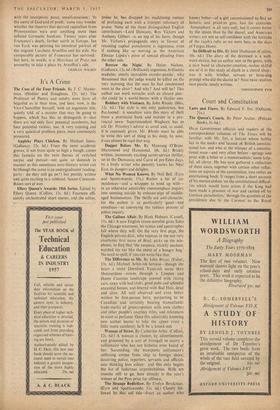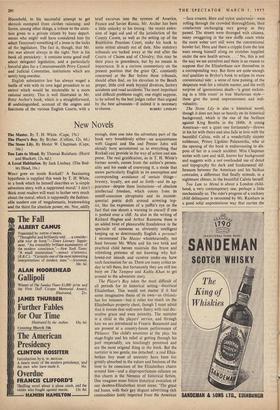Court and Constitution
Laws and Flaws. By Edward F. Iwi. (Odhams, • 21s.)
Hhiti Government officials 'and readers of the correspondence columns of 7'he Times will be familiar with Mr. Iwi, a lawyer whose hobby lies in the nooks and lacuna of British constitu- tional law, and who at the whisper of a constitu- tional issue—and very often before—springs into print with a letter or a memorandum; some help- ful. all clever. He has now gathered a collection of these cases, together with certain other reflec- tions on aspects of the constitution, into rather an entertaining book. it ranges from a short account of his memorandum 'on the constitutional difficul- tieS which would have arisen if the King had been made a prisoner of war and carried off by German parachutists,' through the question of the precedence due to the Coroner to the Royal
Household, to his successful attempt to get shrouds exempted from clothes rationing; and forms, among other things, a tribute to the atten- tion given to a private citizen by busy depart- ments who might well have considered him (to adapt Tennyson) something of a louse in the locks of the legislature. The fact is, though, that Mr. Iwi was almost always in the right. Nor is his book all pernickety : it contains some good stuff about delegated legislation, and a particularly forceful plea for a Commonwealth Privy Council and Judicial Committee, institutions which are surely long overdue.
English substantive law has always waged a battle of wits with its own legal procedure to an extent which would be intolerable to a more rational society. This is well illustrated in Mr. Peter Archer's book, which is a straightforward, if undistinguished, account of the origins and functions of the various English Courts, with a brief excursus into the systems of America, France and Soviet Russia. Mr. Archer has been a little unlucky in his timing: the recent exten- sion of legal aid and of the jurisdiction of the County Courts, as well as the setting up of the Restrictive Practices Court, make his book to some extent already out of date. Also statutory tribunals are tucked away at the end after the Courts of Claims and of Chivalry; this may be their place in precedence, but by no means in importance. It is a curious commentary on the present position that the great QC, constantly concerned at the Bar before these tribunals, should often find, on his elevation to the Bench proper, little civil work beyond divorces, factory accidents and road accidents. The most important and difficult problems ought, one might suppose, to be solved by the best judges rather than argued by the best advocates—if indeed it is necessary



































 Previous page
Previous page